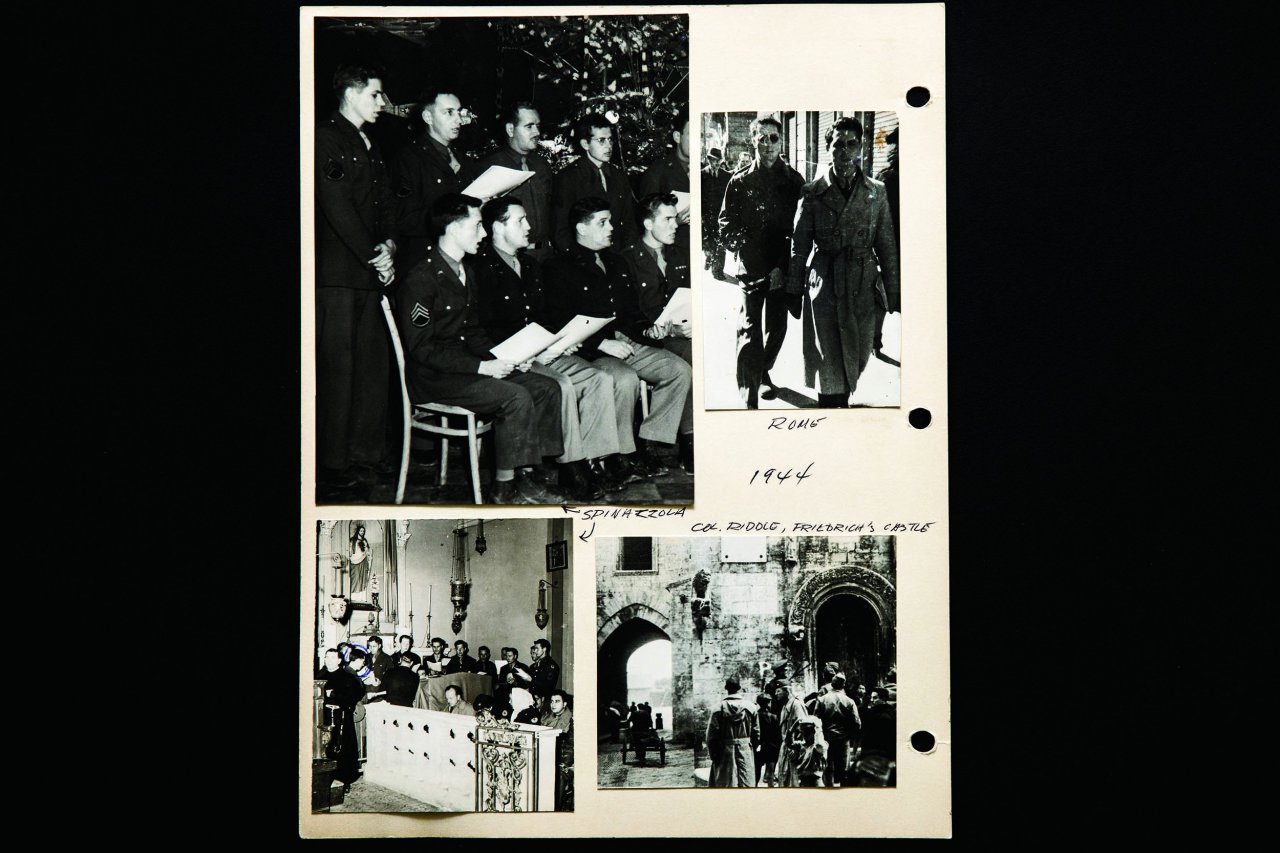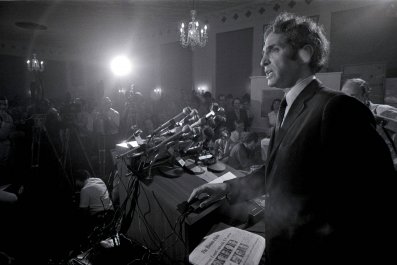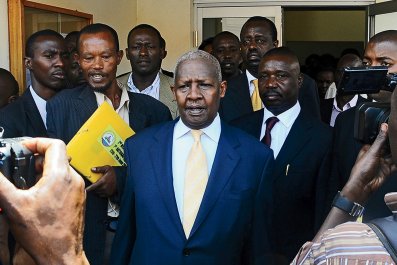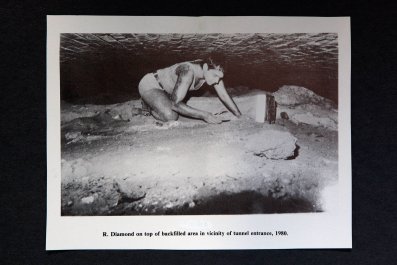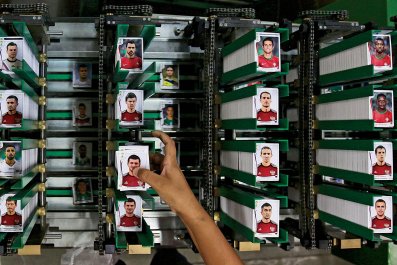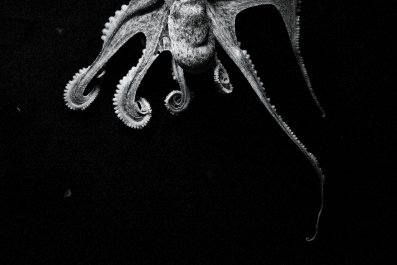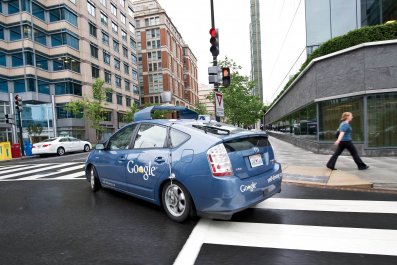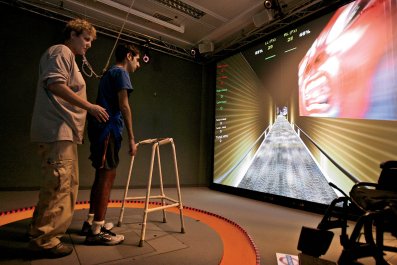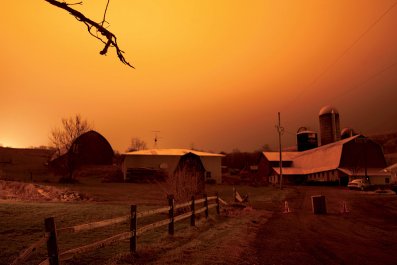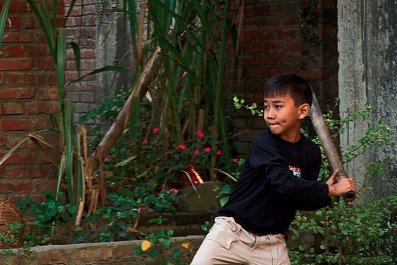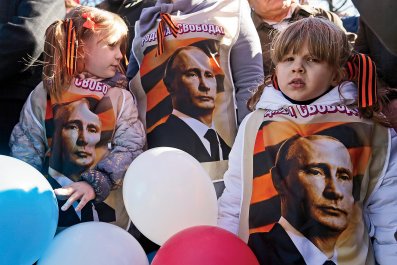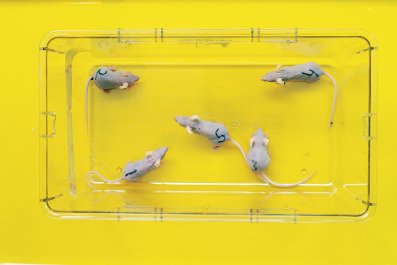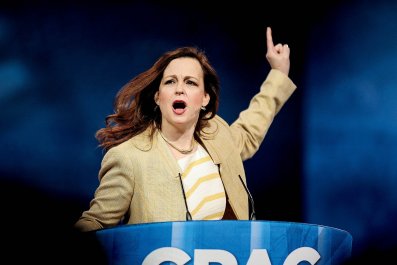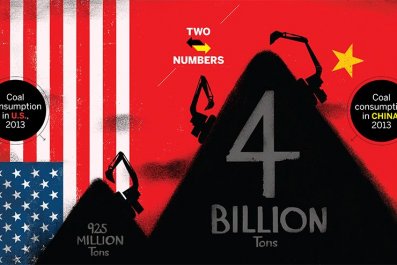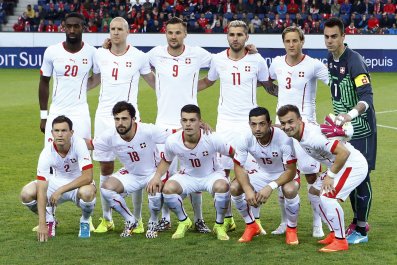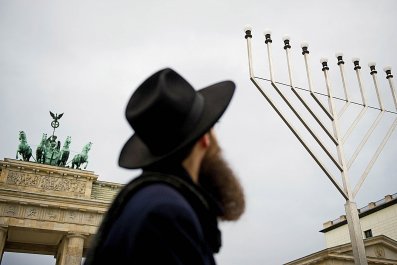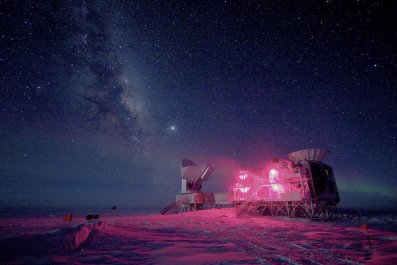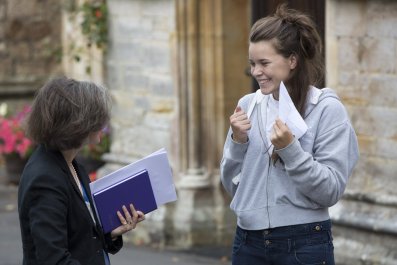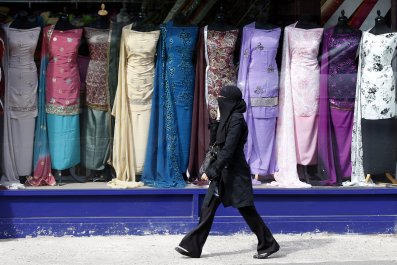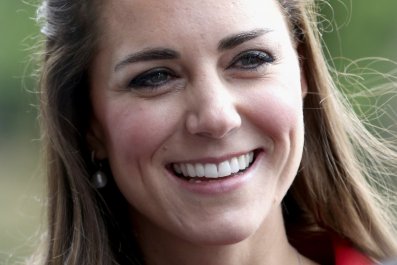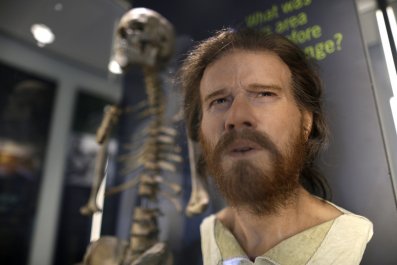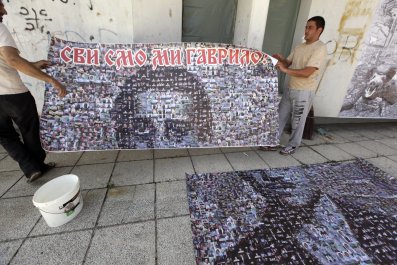Bev Hickok remembers the deafening noise, the ceaseless mechanical hammer blows of women riveting airplanes together. She remembers how everyone smoked on breaks and that all the women wore pants. But mostly she remembers the friends, the women who invited her to sit with them at lunch her first day on the assembly line at Douglas Aircraft Company in Santa Monica, California, in 1942.
"Evidently they took one look at me and said, 'There's another one,'" says Hickok, now 94. They apparently recognized her as one of their own—a lesbian.
World War II has long been viewed by historians as an important moment in lesbian, gay, bisexual and transgender (LGBT) history in America. During the war years, millions of young men left their homes and small towns for the military, living in a same-sex environment where they were exposed to a greater variety and volume of people than they had previously known. Women also left their homes, to work in factories and live in same-sex settings under similar conditions. Some homosexuals were not necessarily declaring they were gay or lesbian, says John D'Emilio, a history and gender and women's studies professor at the University of Illinois at Chicago. "But it creates a space where it's safer and easier to find other people like you and in which there's also—both in military and homefront—more tolerance, because it's the war and we're all working together."
It was a watershed moment in LGBT history, but public historian Donna Graves says most people and places that talk about World War II do not acknowledge it. "There's a national D-Day museum in New Orleans—they don't touch this," she says.
Since the Rosie the Riveter WWII Home Front National Historical Park was established in Richmond, California, earlier this century, Graves has been pushing for the inclusion of LGBT stories. In March the park finally announced a campaign to collect some of those stories for a 2015 traveling exhibit. While recent decades have seen the inclusion of LGBT history in specialized courses and venues, what the Rosie the Riveter park is doing is "pioneering" says Graves, the project's lead historian and an exhibit consultant. "It's one thing for a local entity to document their history, and it's another when a federal agency decides this is really an important story to tell."
Both D'Emilio and Graves view the Rosie LGBT campaign as part of a recent trend within the federal government to openly recognize LGBT people. This can be seen in attempts by the National Historic Landmarks Program and the National Register of Historic Places to acknowledge buildings and landmarks significant to LGBT history. Two cities, San Francisco and Los Angeles, are conducting studies to document such places of historic importance.
That much of this effort is happening in San Francisco—long a gay mecca—is not surprising. The Rosie the Riveter park, located across the bay in Richmond, was founded on the idea that the stories of American civilians on the World War II homefront are complex. From the beginning, a variety of stories have been included, not all of them happy ones: Japanese internment, African-American segregation and Native American hardship. "We want to explode the myth that it's just the white middle-class woman suddenly taking a job in the factory, that Rosie was so much more," says Elizabeth Tucker, lead park ranger at the Rosie the Riveter park.
Tucker, 47, who has long been interested in the issue, only recently discovered that not a single LGBT story was in the Rosie the Riveter collection. Author Therese Ambrosi Smith found this absence a "glaring omission" and was instrumental in helping launch the LGBT campaign. Smith is donating the proceeds from her novel Wax, which tells the story of lesbian characters in the Richmond shipyards, and $1,000 toward an LGBT exhibit. More money poured into the Rosie the Riveter Trust, the nonprofit that supports the park, and the future exhibit was announced. In acknowledgement of the severe prejudice members of the LGBT community faced during World War II, an anonymous tip line was established.
Bev Hickok's friends made the first call, nominating her.
Arrested for Touching
Hickok was an unlikely "Rosie," a woman working for the war effort. Her mother dressed her in white dresses and gloves, and she belonged to a sorority at the University of California, Berkeley. The people she knew then didn't work in factories. They attended dances where they were expected to find suitable husbands, a ritual Hickok detested so much she paid a fine to her sorority to get out of them.
It was at Berkeley that Hickok first started to recognize that she was more interested in women than men. And it was at Douglas Aircraft that she admitted to herself she was a lesbian.
She initially became a Rosie because it was a way to stay on her own after she finished graduate school in Los Angeles. Her parents weren't pleased, but war work was an acceptable reason for her not to return home. She did the job for two years, in part because it was a world in which gender roles were more flexible. For the first time in her life, she was encouraged to wear pants. She met her first gay couple. She lived with a girlfriend.
But the openness was limited; she had to remain guarded in the outside world. "I found that I had to be secret," says Hickok, a thoughtful woman with a sharp wit. "It was exciting in a way—this was a secret society."
She isn't sure what would have happened had she been discovered, but she believes the punishment would have been severe, even prison. Back then, you could be arrested for wearing clothing of "the opposite gender," Graves says. You could also be arrested if you were in a bar and dancing or even touching someone of the same sex and police deemed it a homosexual encounter. "People really were living in fear of losing their jobs, their housing—in the case of someone in military service, of being dishonorably discharged—and even threats of physical violence," Graves says.
While the abundance of women makes the lesbian tales the easiest to obtain, the LGBT project is also attempting to tell the stories of bisexual, transgender and gay civilians serving on the homefront. Selwyn Jones discovered the danger of being openly gay early on. The war brought Jones, a farm boy from Texas, to Tampa, Florida, where he served as a court reporter on a case that involved the dishonorable discharge of a gay man. Although he was not a civilian at the time, he shared his wartime story with the exhibit because it took place in the U.S. and not overseas. "It certainly was an eye-opener," says Jones, a small bundle of energy whose jeans are held up by black-and-white-checkered suspenders.
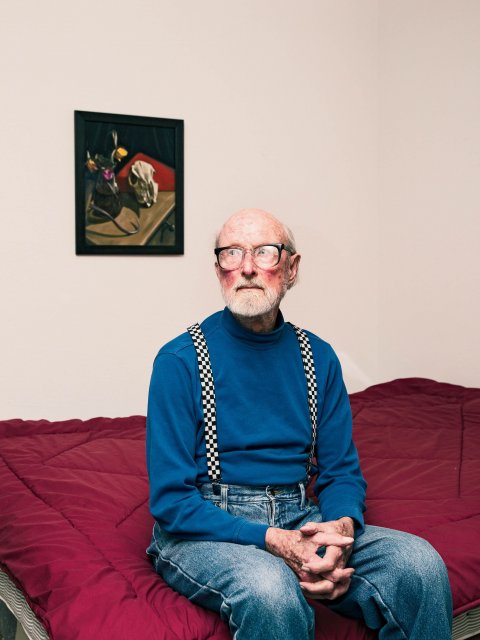
A night owl who rarely schedules anything before noon, Jones has lived in San Francisco for decades. At "92 and a half," he has experienced the swing of gay history, ranging from the activist years of San Francisco politician Harvey Milk in the 1970s to the dark years of the AIDs epidemic in the 1980s (a bedroom photo commemorates a lover who died of complications from AIDS). For Jones the story begins during World War II while he was still in the U.S. before shipping overseas. It was then that he heard the word homosexual for the first time. "I was already behaving like one, but I just didn't have that word for it yet," he says. "Being a farm boy from East Texas, I had never read anything."
He was in his early 20s then, and although he would soon be sent overseas to fight, he was discovering the possibilities, and dangers, of being a gay man in America. After the war, he looked up the man who had been discharged and went to visit him. "I still didn't know many gay men, and I wanted to find out from him what it was all about."
The man took Jones to a bar frequented by both gay and straight men. It was the first time Jones had been to such a place, and the first time he had socialized publicly with an openly gay man.
The Women's Land Army was also a place to discover gay life. The WWII Home Front Oral History Project has collected stories in collaboration with the Rosie the Riveter park. In his story, Jeffrey Dickemann—known then as Mildred—describes several encounters with lesbians while spending a summer helping on farms. While one retelling includes the dismissal of a woman known to be a lesbian, others chronicle the relative openness with which some women engaged in same-sex relationships. For Dickemann, as for Hickok and Jones, the period served as an introduction to gay life.
And yet it was not until late in life that Jones and Hickok were able to be completely open about their sexuality, and Dickemann was ready to make the transition to living as a man. Neither Jones nor Hickok ever told their parents about their sexual orientation, and Hickok worried that her employers at the University of California, Berkeley, where she worked as a librarian, would fire her if they found out. Despite the fears and prejudices they once lived with, both believe society is now ready to hear their stories.
In April, at the LGBT campaign kickoff event in Rossmoor, a senior community in Walnut Creek, California, Hickok shared her story. Around 60 people attended, only a handful as old as Hickok, who has mobility difficulties but remains clear-headed and well dressed.
Her sharp wit is also still in place. When talking recently about a gay hairdresser she spent time with while working as a Rosie, she tugged a strand of her short white hair and said, "I could use him now." The hairdresser couldn't understand how Hickok could endure the noisy environment of the aircraft company. But for Hickok it was far better than when she was surrounded by sorority sisters interested only in "dating and marrying a rich man."
Hickok did eventually marry. In 2008, after the California Supreme Court ruled that a law excluding same-sex couples from marriage was unconstitutional—and before the passage of Proposition 8, which overturned the ruling—she married her partner, Doreen S. Brand. Hickok has outlived Brand and watched as Americans first fought against and now seem to be largely in favor of same-sex marriages.
In 2013 the U.S. Supreme Court ruled against Prop 8's defenders, once again making it legal for same-sex partners to marry in California. The changes in LGBT rights have been monumental, but Hickok continues to take them in stride, she says, "walking along with it."



